Sindhi Kadhi (Vegetable in Gram Flour Gravy)
Ingredients
- 1/2 cup gram flour (besan)
- 3 tablespoons oil
- 1/2 teaspoon fenugreek seeds (mathi)
- 1/2 teaspoon cumin seeds (jeera)
- 3 whole red peppers
- Approx. 10 curry leaves
- 1/2 teaspoon turmeric (haldi)
- 1/2 teaspoon red chili powder adjust to taste
- 1 tablespoon grated ginger
- Approx. 3 tablespoons tamarind pulp (imli)
- 1-1/2 teaspoon salt
- 2 cups of mixed vegetables (I am using 8 okras slit into 2 vertically, 1/4 cup carrots sliced in rounds, 1 small potato cubed, 1/4 cup cut green beans about 1 inch longs)
- Also need 1 tablespoon oil for stir-fry okra
- 5 cups of water
Instructions
- Wash and dry the okra. Remove the top of the okra and stir-fry in 1 tablespoon of oil over medium high heat until they are tender. Set aside.
- Heat the oil in a sauce pan over medium high heat, add fenugreek seed, and cumin seeds, as seeds crack add asafetida, red pepper, ginger, and curry leaves stir for few seconds.
- Reduce the heat to medium and add besan. Roast the besan stirring continually till the besan has become golden brown and aromatic (about 4-5 minutes).
- Add about 4 cups of water slowly, stirring continuously to avoid forming lumps.
- Add turmeric, salt, potatoes, green beans and carrots.
- After Kadhi comes to boil, lower the heat to low medium and cover the pan and let it simmer for about 8-10 minutes, until vegetables are tender. If needed add more water, this should be running consistency but not watery.
- Add okra and tamarind pulp to Kadhi, after kadhi comes to boil, let it simmer for another 6-7minutes over medium low heat.
- Serve hot. Sindhi kadhi taste great with rice or serve as a soup.
How To Make Sindhi Kadhi: Savor The Flavors Of Sindhi Kadhi
Sindhi Kadhi is a flavorful and aromatic dish hailing from the Sindhi cuisine, known for its unique blend of spices and tangy flavors. This Sindhi Kadhi recipe features a medley of vegetables simmered in a creamy gram flour gravy, creating a dish that’s both comforting and nourishing. With its rich flavors and wholesome ingredients, Sindhi Kadhi is a beloved dish that’s perfect for any occasion. Sindhi Kadhi is a traditional dish originating from the Sindhi region of Pakistan and India.
It’s a flavorful and tangy soup made primarily with dal (lentils) and various vegetables. This dish is naturally gluten-free and low in fat, making it suitable for individuals with dietary restrictions. To prepare Sindhi Kadhi, lentils are cooked until they are soft and then combined with a variety of vegetables such as okra, potatoes, carrots, and tomatoes. The soup is seasoned with a blend of spices including turmeric, cumin, coriander, and mustard seeds, which give it its distinctive flavor profile.
To commence the preparation of Sindhi Kadhi, begin by thoroughly washing and drying the okra. Subsequently, delicately remove the tops of the okra and set them aside. Heat a tablespoon of oil in a skillet over medium-high heat. Once the oil reaches its optimal temperature, add the prepared okra and stir-fry until it reaches a tender consistency. This step enhances the flavor and texture of the okra, ensuring it is cooked to perfection. Once accomplished, set aside the cooked okra for future use.
Next, in a saucepan, heat some oil over medium-high heat. Add fenugreek seeds and cumin seeds, allowing them to crackle. As they release their aroma, incorporate the asafetida, red pepper, ginger, and curry leaves, stirring for a few seconds. This process allows the spices to infuse into the oil, imparting their flavors to the dish.
Lower the heat to medium and add besan (gram flour) to the spice-infused oil. Continuously stir the besan until it turns golden brown and emits a fragrant aroma, typically taking around 4 to 5 minutes. This roasting process is crucial as it enhances the nutty flavor of the besan, adding depth to the kadhi.
Gradually pour in about 4 cups of water while stirring continuously to prevent the formation of lumps. This step ensures that the besan is evenly dispersed in the liquid, creating a smooth consistency for the kadhi base.
Now, add turmeric, salt, potatoes, green beans, and carrots to the kadhi base. These vegetables not only contribute to the nutritional value of the dish but also add color and texture. Allow the kadhi to come to a gentle boil, then reduce the heat to low-medium, cover the pan, and let it simmer for 8 to 10 minutes until the vegetables are tender. If necessary, adjust the consistency by adding more water, ensuring that it retains a slightly thick, running consistency.
Once the vegetables are cooked, add the previously prepared okra and tamarind pulp to the kadhi. Allow the kadhi to come to a boil again, then let it simmer for another 6 to 7 minutes over medium-low heat. This final step allows all the flavors to meld together, creating a harmonious balance in the dish.
Tips for Perfect Sindhi Kadhi
Variety of Vegetables: Experiment with different vegetables to add depth and flavor to the kadhi. Vegetables like bitter gourd (karela) and eggplant (brinjal) can also be used to enhance the taste of the dish.
Consistency of Kadhi: Adjust the amount of water added to the kadhi to achieve the desired consistency. The kadhi should have a creamy texture that coats the back of a spoon.
Balancing Flavors: Taste the kadhi and adjust the seasoning according to your preference. You can add more salt, sugar, or lemon juice to balance the flavors and enhance the taste.
Variations of Sindhi Kadhi
Paneer Kadhi: Add cubes of paneer (Indian cottage cheese) to the kadhi for a creamy and indulgent variation. Paneer adds richness and protein to the dish, making it more satisfying.
Sprouted Lentils: Add sprouted lentils such as moong dal or matki to the kadhi for added nutrition and texture. Sprouted lentils are high in protein and fiber, making them a healthy addition to the dish.
Benefits of Sindhi Kadhi
Rich in Vitamins and Minerals: Sindhi Kadhi is loaded with a variety of vegetables, providing essential vitamins, minerals, and antioxidants that promote overall health and well-being.
Digestive Aid: Gram flour (besan) is known for its digestive properties and helps aid in digestion, making Sindhi Kadhi a comforting and soothing dish for the stomach.
Wholesome and Nourishing: With its blend of vegetables, spices, and gram flour gravy, Sindhi Kadhi is a wholesome and nourishing meal that’s perfect for the whole family.
Frequently Asked Questions (FAQs)
Can I make Sindhi Kadhi without vegetables?
Yes, you can make a simple version of Sindhi Kadhi using only gram flour and spices for the gravy. However, adding vegetables enhances the taste and nutritional value of the dish.
Can I make Sindhi Kadhi ahead of time?
Yes, Sindhi Kadhi tastes even better when allowed to sit for a few hours or overnight, allowing the flavors to develop. Reheat it gently before serving.
Is Sindhi Kadhi gluten-free?
Yes, Sindhi Kadhi is naturally gluten-free as it contains no wheat or gluten-containing ingredients.
Explore more delightful Sindhi recipes on Manjula’s Kitchen, such as Sindhi Koki for another culinary adventure.
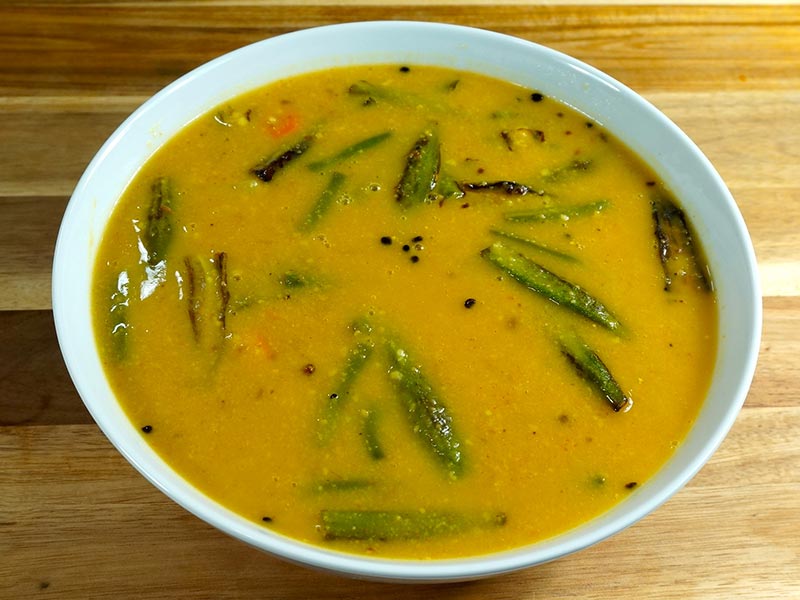
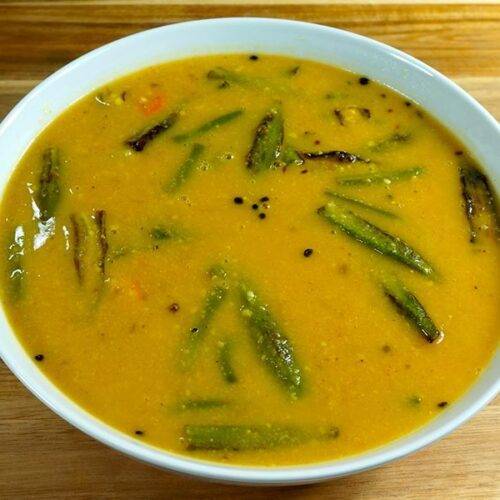
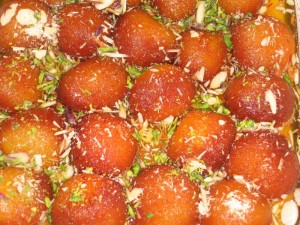
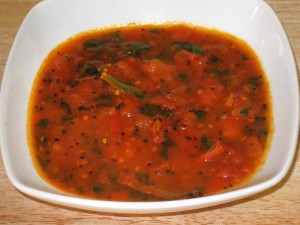
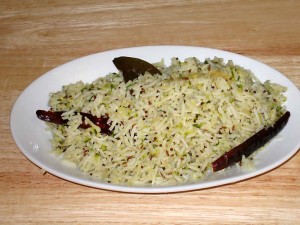
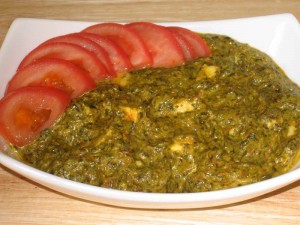
Sanjay Lulla
March 20, 2020 at 9:22 amYou forgot main vegetable drumstick. No need to fry okra as it doesn’t get slimy while boiling. We never fry okra seperately but add with other veggies. Yes guvar also must but please don’t add cabbage ????. Otherwise recipe is perfect.
Anjana
May 18, 2019 at 4:46 amI’m a Sindhi and prepare it the same way but also add gur or jaggery too, it makes the curry all the more tangier.
Manjula Jain
May 18, 2019 at 6:08 pmsounds good will try next time
Maria
July 11, 2017 at 8:00 pmHi Manjula
The kadhi recipe looks great. I’d like to give it a try. You’ve mentioned 3 whole red peppers in the recipe but you haven’t used them in the video of the recipe. Not sure what you mean by whole red peppers. Do you mean bell peppers? Would be great if you could please clarify. Thanks.
Manjula Jain
July 19, 2017 at 2:29 pmMaria, dry red chilies
Khushi Jain
October 24, 2016 at 3:27 amKadhi is always liked by my Restaurant Customers, but Sindhi Kadhi seems to have different process. Thanks for detailed recipe process
Romi
February 15, 2016 at 11:16 amManjula
If I want to make it for 18 people and making everything 6 times, does the water get put 6 times more. Or only about 2.5 times more.
Plus, last time I made, the veg. Were a little less
Manjula Jain
February 15, 2016 at 12:52 pmRomi, start with two cups of less water and add as needed, about vegetables you are the chef in your kitchen add to your taste.
Rajni
February 15, 2016 at 8:32 amNamaste, Hum aur kaunsi sabziyon ka istamaal kar sakte hein ?
Manjula Jain
February 15, 2016 at 12:54 pmRajni, eggplant, cabbage will go well
Romi
February 3, 2016 at 7:44 pmDear Manjula
Can you please answer my question below regarding tamarind pulp. If I’m using concentrated tamarind paste, how much?
Manjula Jain
February 4, 2016 at 12:41 amyou need to use may be 2 teaspoons if needed add later
Anup
February 3, 2016 at 4:43 amWhenever I cook lashing it splits if boiled for 5minutes or more will it not get split if boiled long
Manjula Jain
February 3, 2016 at 5:40 pmAnup, sorry I did noe understand your question
Romi
January 31, 2016 at 9:39 pmManjula
I can’t thank you enough. Thank you thank you. Such easy recipes. Convenient. You’re amazing. I just reduce the oil little bit.
Manjula, for Sindhi curry, can I use ready made tamarind paste? How much.
Romi
January 31, 2016 at 9:36 pmManjula
I can’t thank you enough. Thank you thank you. Such easy recipes. Convenient. You’re amazing. Fool proof recipes.
Manjula, for Sindhi curry, can I use ready made tamarind paste? How much.
diviya
November 5, 2015 at 11:20 pmExcellent Recipe and try this recipe in my home.My family loved very much and i get all ingredients from Maxsupermart – Online Indian Grocery store product is fresh quality.I’m happy with out come.
mam
October 29, 2015 at 11:55 pmJust curious regarding KADHI word, I know KADHI means it made of YOGURT!
In this recipe I do not see mixing yogurt at all….
If anyone can send me email about it, will be greatly appreciated!
Thanks.
Manjula Jain
October 31, 2015 at 4:47 pmmam, sorry I have never heard that I make many other kadhi without yogurt.
Saavi
November 7, 2016 at 4:25 pmMam ji
1) Yogurt (or khatti lassi/chhaachh) is used in punjabi kadhi…..
So you don’t need to use tamarind for khataas…
Saavi
November 7, 2016 at 4:33 pm2) When you simmer something slowly for long period of time, the process is called (in punjabi) “KADHNA” e.g. maine doodh ko ghanta bhar kadhne rakha… or do ghante “kaadha”
Since with punjabi kadhi, we dont roast or fry besan, before adding water, so we have to simmer it for at least half an hour to an hour…
So kadh kadh ke bani, is liye its called “KADHI”
Hope this answers both your questions….
Good luck
JM
February 20, 2021 at 9:51 amVery clear and good explanation of the words Kadhi, kaadha and kadhna. Thank you Saaviji.
mudra
September 13, 2015 at 10:00 pmDear Manjula Ma’am,
Made Sindhi Kadhi as per your recipe, it turned out great ! it was the first time that i ventured to make sindhi kadhi and obviously had my apprehensions and jitters. your instructions were very easy to follow even for a novice like me and the simplified, step by step manner in which the recipe was presented helped me in nailing the recipe in the very first go !! Both my husband and me relished it to the fullest… Thanks a lot
Manjula Jain
September 13, 2015 at 11:17 pmMudra, Thank you
shubhi
March 3, 2015 at 6:37 amCan I use amchur as alternate of imli.
Manjula Jain
March 3, 2015 at 9:05 pmshubhi, amchoor and imli both has very different but amchoor will work.
naurael
February 21, 2014 at 1:55 pmHi, Manjula ji!
Again, one of your recipes was fabulous! Three colleagues and I cooked it at work today, together with your cucumber salad – it turned so very, very tasty… And it was really easy, so everybody could take part!
I’m working on turning all my acquaintances into avid Manjula-fans, and this went a long way to doing just that at my workplace… Success! 🙂
Thank you again for your wonderful website. If I may ask – do you have any plans for converting your E-book into an ordinary book (I mean with pages and such)? It certainly would be easier to use in the kitchen, and less hazardous to my netbook, too… 🙂
All the best to you and your family
Naurael
jayalakshmi
September 30, 2013 at 10:10 pmvery easy and tasty receipes
Maya
September 19, 2013 at 10:21 pmAunty thank you so much for your amazing website! I have learned how to cook delicious indian food thanks to you!!! The one dish I have always wanted to make is Sindhi curry. I tried following recipes from other websites but they never came out good. I decided to give your recipe a try and WOW it came out amazing! Exactly the way I wanted! My husband absolutely loved it. Thank you so much!!!!!!
seetha
September 6, 2013 at 7:10 amVery good recipe. I always like to visit your blog because it has pure vegtarian recipes. I love your videos.
Anu
September 5, 2013 at 9:29 pmI think this will looks good. I will try at my home.
alex clarkson
September 5, 2013 at 10:48 amdifferent and unique recipe, will try this soon, looks delicious
Mike
August 30, 2013 at 7:32 amWhen I saw another kadhi recipe, I had to try it, even though getting okra was hard where I live. I like the “creamier” kadhi in the gatte ke kadhi recipe for what it is, but this one seems to fit it’s own dishes, and the soup style really nicely!
I hope you’ll get out some more kadhi variations in the future… I’m never disappointed!
Tom
August 28, 2013 at 8:44 amThis was my firest time using tamarind as an ingredient – it works really well here – adds some nice crisp high notes.
Austin
August 24, 2013 at 2:47 amI love your recipes Manjula – thank you for sharing them. I have a question: would this be good with bitter gourd as one of the vegetables or would this be too overpowering? If so would you salt the gourd before using it? With best from Milan!
Manjula Jain
August 24, 2013 at 9:02 pmAustin,
Bitter Gourd will be very overpowering.
Ramesh Mundhra
August 23, 2013 at 7:13 pmJust watched the video. It seems to be tasty one . let me try it home and I shall respond back.
Eleanore Rose Rosanova
August 22, 2013 at 9:29 amIt sounds deliscious but where do you find the asafetida or the tamarind pulp? I may be able to find the Pulp, but I’ve never heard of or seen asafetida. I’m in the inland empire, in Calif. What grocery store do you frequent? Your kitchen must be very fragrant. Blessings,
Elly
Manjula Jain
August 22, 2013 at 10:31 amEleanore,
Every Indian grocery store will have asafetida or you can buy from Amazon
Tom
August 28, 2013 at 8:46 amI bought it as Hing.
Heeru
August 22, 2013 at 7:48 amVery good recipe. Perfectly made. We make it exactly the same way, only we add grated tomatoes while adding vegetables, and pinch of sugar, and fresh cilantro in the end.